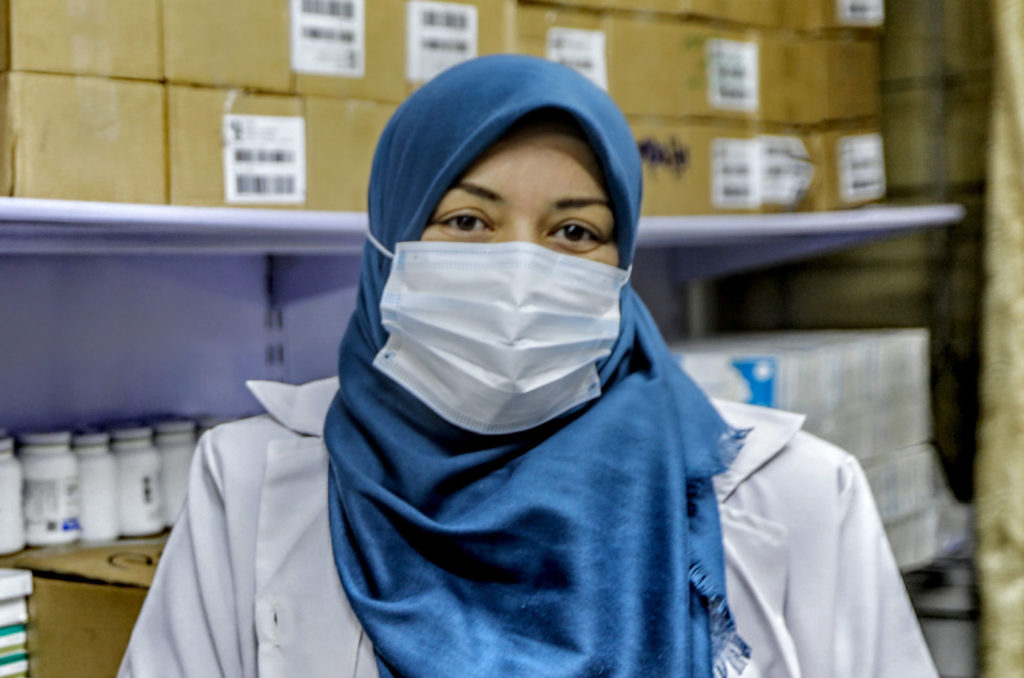Mental Health Medicine in Gaza
Posted in: Programs
Dr. Rosaline Al-Qishawi, in conversation with Anera’s Rania Elhelo.
Dr. Rosaline Al-Qishawi has been working at Shifa Hospital’s psychiatric department for 21 years.
Rania: What are the main challenges facing you at your work in the mental health sector?
Rosaline: The biggest one is the shortage of essential medicines in Gaza. This psychiatric unit at Shifa Hospital is the only one of its kind in Gaza. There are, though, six other community mental health centers located across Gaza.
Rania: What are the most widespread diseases they suffer from?
Rosaline: We see schizophrenia in its various forms. It’s the most vicious mental illness, as it’s a chronic disease. Also a challenge are our modern diseases and symptoms – like depression, anxiety, stress, panic attacks and fear. After the bombardment in May, on top of COVID, we have witnessed an increase in the number of obsessive-compulsive disorder patients.
Rania: Could you please tell us about the medicine you received from Anera and IHP? How effective are they?
Rosaline: Since the beginning of the year, we’ve received a large amount of essential drugs, most of which are antidepressants. We got these drugs at a time when there were no antidepressants in mental health centers. Now, thanks to Anera and IHP, our doctors have options and can choose the most suitable treatment from among the antidepressants they provided.


Rania: Are the numbers of mental health patients increasing in Gaza?
Rosaline: Mental health diseases have a genetic cause and an environmental factor. When the two factors come together, that’s when symptoms appear. The difficult environmental and socioeconomic conditions we experience — the problems of family relationships, local divisions, and the unemployment crisis — may be the primary cause for the surfacing of many mental health illnesses, more so than genetic factors.
Rania: Would you please give us further information and a particular example?
Rosaline: [One of the medicines from IHP is an anti-depressant]…It’s a 20 ml dose-drug, and it can be used at high doses for cases of phobias, panic attacks, and OCD. The side effects of this medicine are mild and many patients have reported improvement in their symptoms and their mood.
Rania: October 10 is the World Mental Health Day, what is the message that you would like to share?
Rosaline: October 10th is a day designated by the World Health Organization (WHO) as World Mental Health Day. There is a special slogan set by the WHO for this day every year. The slogan of 2021 is “Mental health care for all: let’s make it a reality.”
Let’s make mental health and care a right for every citizen, whether employed or not, mentally ill or not. How else can we preserve our mental health? And we need to provide tips for mental self-care so that we do everything we can to avoid mental illnesses.
OUR BLOG
Related
Part of a series on the impact of the war on all sectors of economic life within Gaza, Anera’s immediate response and plans for the future. Other posts cover housing, education, WASH, health and food production systems. Livelihood Recovery In Gaza, 57 years of occupation and…
InterAction and 50 Member CEOs, some of whom have organizations that work in Gaza, urge President Biden to take decisive and actionable steps to alleviate the humanitarian crisis in Gaza. Detailed within this letter are specific steps and commitments that…
